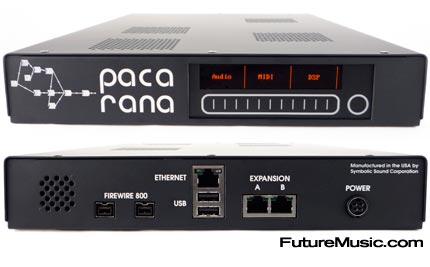Symbolic Sound Debuts New Paca & Pacarana Music Computers
Symbolic Sound Corporation has announced two new music-specific computers for sound design and live performance. The Pacarana and Paca are two new multiprocessor computers optimized for capturing, processing and synthesizing sound for the award-winning Kyma Sound Design Environment.
Designed by Symbolic Sound Corporation to serve as a smaller, more affordable and more powerful replacement for the Capybara*320 sound computation engine, the new entry-level system is 5 times more powerful and costs $500 less than the older entry-level configuration. The power of the higher-end model exceeds that of a fully-loaded Capybara*320 but costs far less than half as much.
Favored by sound designers for its unique set of algorithms, the ease with which one can create endless combinations of sound processing and synthesis algorithms, its reliability during live performances, and the responsiveness of real-time control over sound parameters, the Kyma sound design environment benefits from the new Paca(rana) platforms in the form of more polyphony, denser textures, faster loading times, more memory for live sampling and playback, enhanced portability, refinements in sound quality and the potential for future developments.
Sound designers who have been using Kyma X on the Capybara*320 can open and continue working on their current projects using the new hardware. Switching back and forth between the Capybara and the new hardware is completely transparent, and Symbolic Sound will continue to support Kyma X on the Capybara-320. Kyma users also have the option of keeping their Capybara*320 computer running alongside a new Pacarana, augmenting, rather than replacing, their current hardware.
Symbolic Sound decided to make the Pacarana and Paca small and light enough to fit into a backpack, laptop case or in a small rolling rack. The Pacarana footprint is the same as that of a MacBook Pro 15″ (the Paca is about 3 inches shorter) and is 1 rack unit in height: ideal for live performances, working on the road, transporting from home studio to sound stage or from work to home.
On the back of the Paca(rana) are 2 USB ports, 2 FireWire 800 ports, and a DC power plug that connects to an external power supply brick (about the same size as the Mac Mini’s power brick). The Paca and Pacarana communicate with the Kyma X software running under Mac OS or Windows via FireWire 800 (IEEE 1394B) or FireWire 400 (IEEE 1394A) using an 800-to-400 adapter cable. Audio and MIDI input and output is handled by an external FireWire or USB converter or, for current Kyma owners, through a Capybara-320 with Flame FireWire I/O. Additional USB MIDI controllers like keyboards or fader boxes can be connected via the second USB port.
Symbolic Sound decided to decouple the sound conversion from the sound computation functions in order to give customers more options for customizing their studio and mobile setups. Customers can now select from among a full range of high-quality third-party 1394TA AMDTP-standard FireWire and class-compliant USB audio converter devices available in nearly every size and price range. The growing list of qualified third-party converters includes the TC Electronic Konnekt series, the MOTU UltraLite-mk3, the Apogee Duet, and, on the USB side, the M-Audio Fast Track Pro and Logitech and Sennheiser USB headsets.
You can use any USB or FireWire MIDI device or software for controlling sound parameters on the Paca(rana). Symbolic Sound has been working closely with Haken Audio to create seamless plug-and-play operation with the new MIDI-based Continuum fingerboard. Additional controllers with a high degree of Kyma integration include the Wacom tablet, the MotorMix, and the controllers supported by Camille Troillard’s OSCulator (http://www.osculator.net) software, including the Nintendo Wiimote, the Jazz Mutant Lemur, the Logitech Space Navigator, and others.
Symbolic Sound’s new Paca and Pacarana are available now for $2970 and $4402 respectively. More information on Symbolic Sound Paca and Pacarana music computers.









